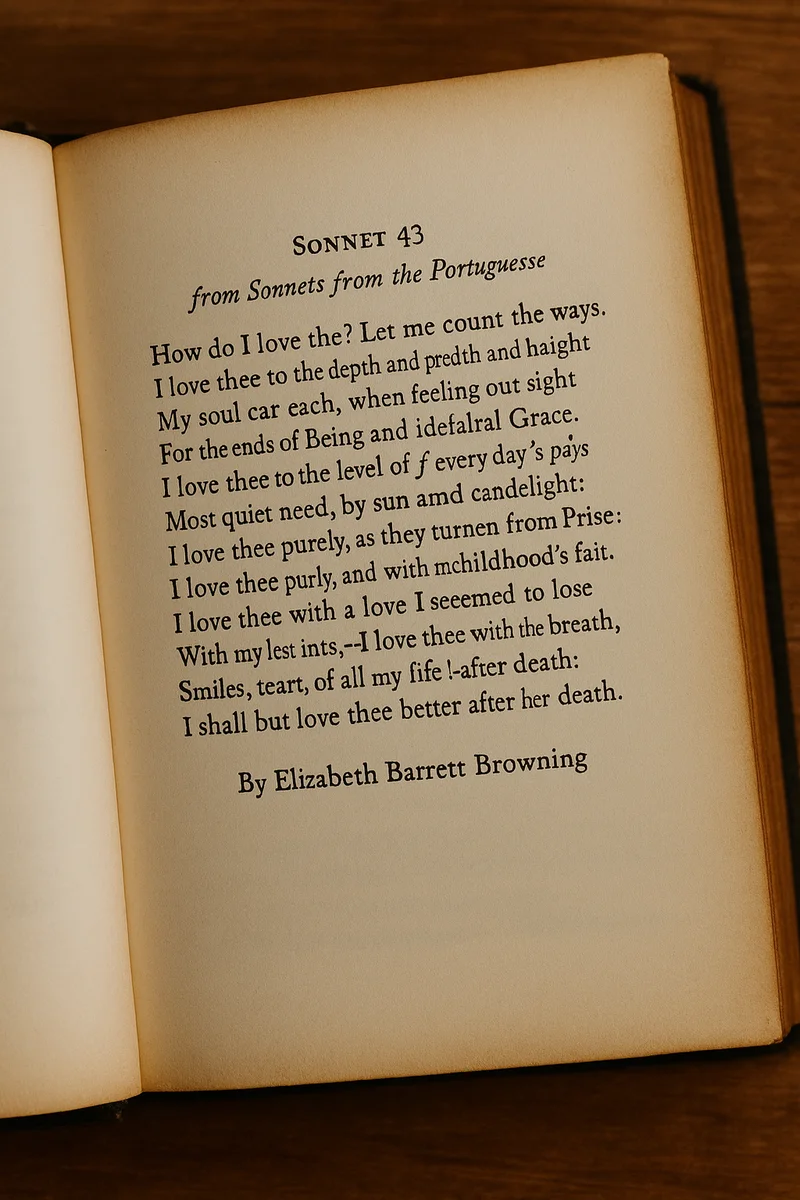
Poem: Sonnet 43 from Sonnets from the Portuguese
By Elizabeth Barrett Browning
Poem (Original Text with Word Meanings)
How do I love thee? Let me count the ways.
I love you – let me list all the ways I do.
I love thee to the depth and breadth and height
I love you deeply, widely, and completely –
My soul can reach, when feeling out of sight
As much as my soul can feel, even when I can’t see or touch it,
For the ends of Being and ideal Grace.
(For the purpose of existence and divine beauty or perfection)
I love thee to the level of every day’s
I love you with the same steadiness
Most quiet need, by sun and candlelight.
As I need peace and comfort every day, in daylight and at night.
I love thee freely, as men strive for Right;
I love you freely, like people fight for justice or truth.
I love thee purely, as they turn from Praise.
I love you sincerely and humbly, without needing recognition.
I love thee with the passion put to use
I love you with the same intense emotion I once gave
In my old griefs, and with my childhood’s faith.
To past sorrows and the trusting heart of a child.
I love thee with a love I seemed to lose
Even the love I thought I had lost before,
With my lost saints,—I love thee with the breath,
(Saints = people once revered; Breath = every moment of life)
Smiles, tears, of all my life!—and, if God choose,
Through every joy and sorrow of my life—and if it’s God’s will—
I shall but love thee better after death.
I will love you even more after I die.
Word Meanings and Synonyms
| Original Word/Phrase | Meaning | Synonyms |
|---|---|---|
| Depth and breadth and height | Dimensions of love | Extent, size, range |
| Ideal Grace | Perfect spiritual beauty | Divine perfection, pure goodness |
| Quiet need | Everyday comfort and peace | Subtle desire, daily need |
| Strive for Right | Fight for justice | Seek truth, pursue fairness |
| Purely | Without selfish motive | Honestly, genuinely |
| Passion | Strong emotion | Intensity, fervor |
| Griefs | Sorrows | Heartaches, sadness |
| Saints | Revered people (possibly loved ones lost) | Virtuous figures, beloved souls |
Poem Summary
“Sonnet 43” is one of the most cherished English love poems ever written. Elizabeth Barrett Browning expresses her deep, boundless love for her husband Robert Browning. She counts the many ways she loves him: with her soul, in everyday moments, freely, purely, and with the intensity of past pain and childhood innocence. Her love is so powerful that it transcends life itself—she believes it will continue even after death.
This poem is not just a romantic confession—it’s a declaration of spiritual and eternal love.



